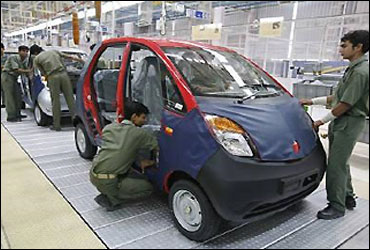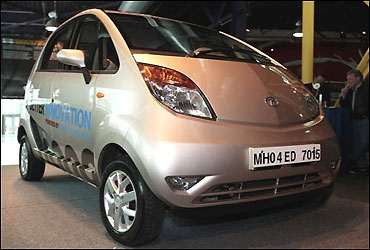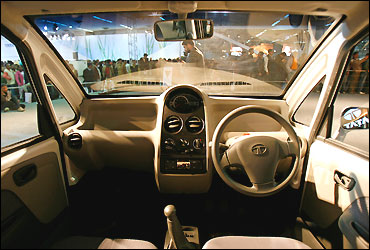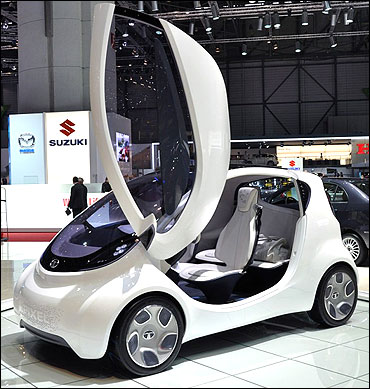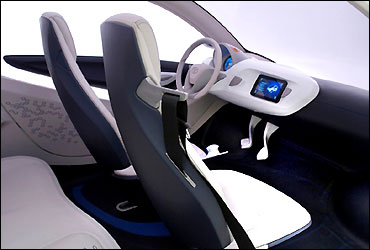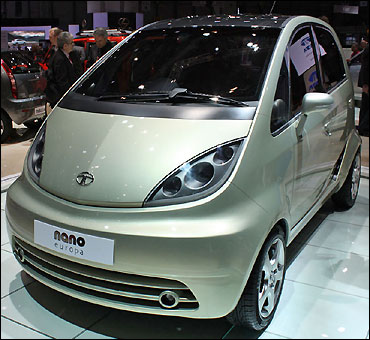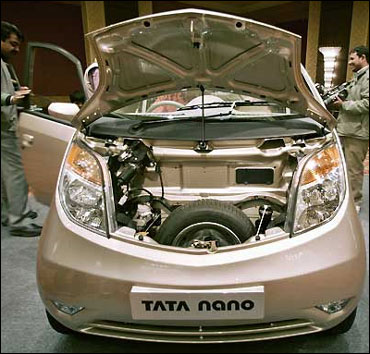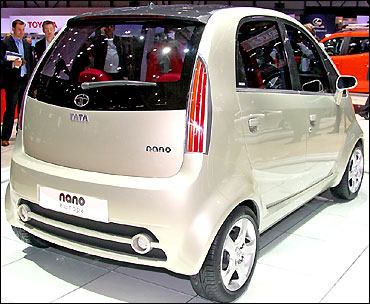 | « Back to article | Print this article |
The past, present and future of Tata Nano
Tata Nano, one of the world's cheapest car, entered Sri Lanka's lucrative taxi market on Thursday with a fleet of 45 cars and an overload of passengers.
A local company launched the service as an alternative to expensive air conditioned taxis, but more comfortable than the ubiquitous three-wheel taxi.
"We launched with 45 cars and hope to raise the fleet to 200 before the end of this year," a spokesman for the Nano Taxi company said.
He said the fare was almost half of what is charged by other companies which use Japanese and Korean-made sedans.
The Nano Taxi will also employ female drivers, he said.
Nano was launched in Sri Lanka late last month as the first foreign destination for Tata's smallest car.
Although it costs just over $3,000 in India, the same car costs over $8,500 in Sri Lanka because of high local taxes.
Click NEXT to read more...
The past, present and future of Tata Nano
Tata Nano enters Sri Lanka
Tata Nano, Tata Motors' dream project, has seen many tough times. From the initial technical glitches to the Singur factory controversy, there were many factors that almost stopped the small car from coming into existence.
Finally, overcoming the hurdles the lakhtakiya car (Rs 1-lakh car) was launched in March 2009.
The Singur plant pullout in fact delayed the car from hitting the market earlier.
This delay wasted two years and at last Tata was invited to start production of Tata Nano in Gujarat.
Let's see what made it so cheap, how it has been welcomed in India, what marketing plans Tata has for it besides exporting the Nano to Sri Lanka, its upcoming diesel variant and the stunning derivative Tata Pixel.
Click on NEXT to read more..
The past, present and future of Tata Nano
What makes Tata Nano so cheap?
The cost-cutting features in Tata Nano begin from the rear rather than from the front. The Nano's trunk is fixed. There is only one wiper.
Besides, there is no power steering and there is the two-cylinder 623cc engine. Apart from this the car has no airbags, no entertainment devices inside, and there is only one rear view mirror.
Click on NEXT to read more...
The past, present and future of Tata Nano
Tata Nano in India: Its acceptance
In the beginning, Tata Nano was more an attraction than a car worth buying. Initially it was flooded with bookings but things did not go as expected and there were booking cancellations as well.
Later, when people found it almost as cost-effective as a two-wheeler, sales started climbing. After over a year after, Tata sold 509 Nanos in November 2010.
This figure rose to 5,784 unit sales in December 2010, thanks to the aggressive strategy adopted by Tata Motors.
Recently Tata Nano sales have crossed the 10,000 unit sales in April 2011.
Click on NEXT to read more...
The past, present and future of Tata Nano
Innovative marketing strategy for India
Initially, Tata preferred to follow the conventional marketing strategy. However, there were initial tie-ups with Westside and Croma, but things didn't work till Tata adopted an aggressive line of action.
Contrary to the total 'word-of-mouth campaign' approach, Tata reworked its approach and had a tie-up with Future Group to sell the Nano at Big Bazaar outlets.
This brand has over 150 million footfalls every year and the tie up helped enhance Nano's visibility.
Tata Motors parked a Nano at every Big Bazaar outlet. In April alone 450 Nanos were sold from Big Bazaar outlets across the country.
Click on NEXT to read more...
The past, present and future of Tata Nano
Tata Nano export plans
Currently, over 10,000 Tata Nano units are produced in India.
Tatas have planned to export Nano in the form of completely built units (CBUs) rather than the completely knocked down (CKD) form adopted by most of the car makers around the world.
After ensuring pan-India presence, Tatas target Nano to be a world car.
Initially, Tata reportedly planned to take the Nano to Indonesia and South Africa and then to Thailand, Sri Lanka, Romania, Turkey and Brazil.
Click on NEXT to read more...
The past, present and future of Tata Nano
Tata Nano for Sri Lanka
Realising the dream to make Tata Nano a world car, Tata launched its small car in Sri Lanka recently.
Initially, Tata Nano will be sold in the island country through the company truck dealer and at a later stage, Tata may think of recruiting another dealer.
In order to export it to Sri Lanka some necessary safety features were up graded in the car.
The Tata Nano price in Sri Lanka in Sri Lankan rupees is 925,000, which is higher than its price in India (1 Indian rupee is equal to 2.45 Sri Lankan rupees).
Click on NEXT for more...
The past, present and future of Tata Nano
Initially, only 500 Nanos were sent to Sri Lanka and the number would be increased based on the demand.
Upcoming Tata Nano Diesel & Tata Pixel
There are two small cars in the waiting. One is Tata Nano Diesel and the other is Tata Pixel.
If all goes well, it is expected that Tata Nano will be blessed with a diesel engine, making it much cheaper to run than its petrol sibling.
Tata Pixel on the other hand is a new city car, however it is meant for release in Europe initially. Tata Pixel is based on the Tata Nano and is just over three metres in length.

CarDekho.comoffers the best platform in India to research cars online. Make better car buying decisions using features like car research, reviews, car comparisons, discounts, on-road prices etc. on CarDekho.com.
